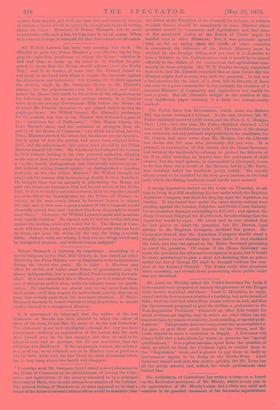Sir Wilfrid Lawson has been very amusing this week. OR
Monday he gave the Prime Minister a very effective rap by beg-
ging the right hon. gentleman to inform the House "whether he had had time to make up his mind as to whether he pro- posed to move that the House should adjourn over the Derby Day," and it is worthy of note that Mr. Disraeli found no rod ready to his hand with which to requite the innuendo against his dilatoriness and indecision. On Tuesday Sir Wilfrid opposed the motion, made by Mr. Gathorne Hardy in Mr. Disraeli's absence, for the adjournment over the Derby Day, and enter- tained the House very much by his review of the alleged reasons for following this by no means ancient custom, in a Session when there are seventy Government Bills before the House, all of which Mr. Disraeli threatens to get passed before he lets his pupils go down. Sir Wilfrid fancied Mr. Disraeli's preference for the custom was due to the illusion that it formed a part of the "unwritten law of Parliament," "like Magna Charta, the Lord Mayor's show, and the exclusion of strangers from the gallery of the House of Commons,"—to which unwritten law the Prime Minister avowed the other day his almost servile devotion. But in point of fact the custom had never been adopted before 1847, and the adjournment had never been moved by the Prime Minister himself till 1860. Mr. Gladstone had adopted the custom in 1872 without lending it his own personal authority, alleging as his reason that horse-racing was believed "by the House" to be a "noble, manly, distinguished, and historically national sport." But without setting himself against "so distinguished a sporting authority as the late Prime Minister," Sir Wilfrid thought he might ask for reasons why horse-racing should be thus described. He thought there was an anomaly in adjourning the House for only two hours on Ascension Day and for the whole of the Derby Day. If it were really a national occasion, then the Speaker should go, as he did at the thanksgiving for the Prince of Wales's re- covery, in his state-coach drawn by brewers' horses, to attend the race, and in that case a great number of the Commons would cheerfully attend him, and "protect him from the people he would meet there." However, Sir Wilfrid Lawson's sense and nonsense were equally fruitless. He carried only 81 into the lobby with him against the motion, while 206 voted for it. The House of Com- mons will have its whim, and for nearly thirty years this has been its whim, one none the worse, by the way, for being a newish whim. Indeed, what are whims, if they are not things which may be changed at pleasure, and without reason assigned ?


































 Previous page
Previous page